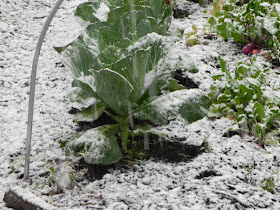Despite snow and ice, some of our (very devoted) members, board members and staff came together at the CT NOFA Annual Meeting at Common Ground High School in New Haven on Saturday. Our farm tour was cut a bit short by inclement weather:
Hoods, hats, gloves and jackets were required for the tour in this unseasonal snow.
We watched snow accumulate on the hardy crops still planted in the Common Ground Farm.
Shannon Raider and Melissa Spear showed us their new out door space (it was especially handy for this situation).
Back inside, the Common Ground Cafeteria was warm and full of food that each attendee brought.
We all ate quite well.
Our president James Roby (picture coming soon . . .) explained the organization's growth in the past several years and outlined some of CT NOFA's plans for the future. Our Executive Director Bill Duesing explained the history of Common Ground High School (he helped found the environmental magnet school in the 1990s), and also discussed CT NOFA's many programs for beginning farmers, experienced farmers, landscapers, home owners, organic consumers, gardeners, students, teachers . . . the list goes on.
Bill, James and Robert Burns, a member farmer and Connecticut anti-GMO activist introduced the GMO issue, explaining the thrat GMOS pose to farmers, to consumers and to an individual's right to choose what they put in their bodies. Representative Richard Roy braved the storm to talk to the group about his work to get GMOs labelled in Connecticut. A bill demanding GMO labeling was passed by the Connecticut Environmental Committee of which Rep. Roy is chair, however the bill died in the state senate.
Unfortunately our Member of the Year, Sal Gilbertie of Gilbertie's Herbs in Westport, CT was unable to come because of the weather. We hope to honor him at another event. A big thanks to Representative Roy for venturing out in the terrible weather! If you couldn't make it because of the weather keep an eye out for our other events coming up, we have a workshop coming up in November and hope to have another Annual Meeting type of event during our Winter Conference, scheduled for March 3, 2012.




















































